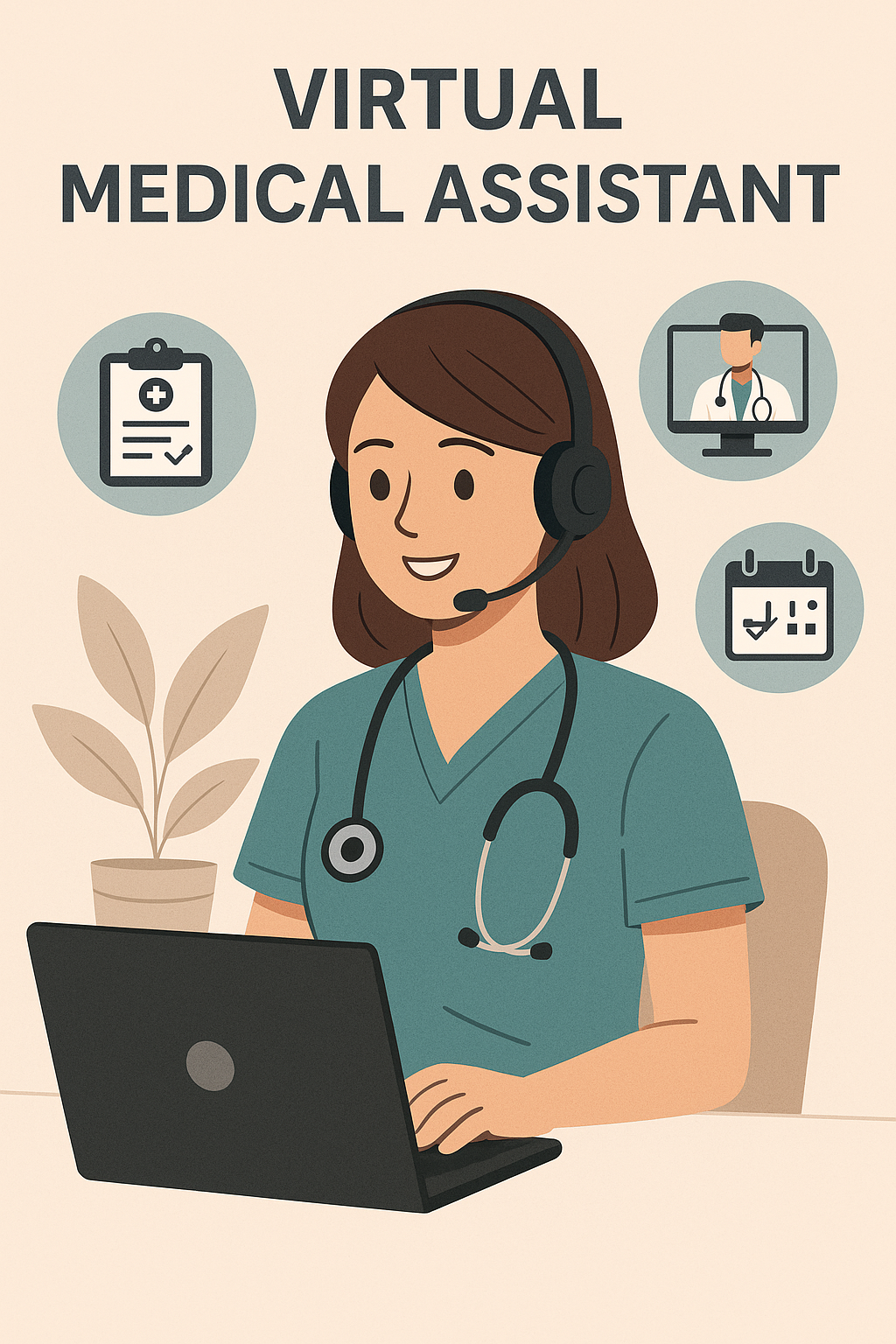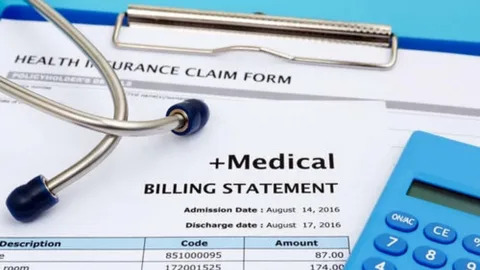
Virtual Medical Assistant: Revolutionizing Healthcare Administration
Virtual Medical Assistant: Revolutionizing Healthcare Administration
Introduction to Virtual Medical Assistants
Definition and Scope
In the current-day, all-at-once evolving healthcare panorama, the characteristic of a virtual medical assistant (VMA) has turn out to be increasingly more pivotal. A VMA is a healthcare professional who offers administrative and clinical resource services remotely, using digital device and structures to assist physicians, nurses, and extraordinary healthcare providers. This function has a extensive variety of competencies, from coping with affected man or woman facts and scheduling appointments to facilitating telehealth consultations and handling billing strategies.
The scope of a VMA's duties is high-quality, adapting to suitable dreams of healthcare practices. Whether it's for a solo practitioner or a huge clinic community, VMAs provide flexible solutions to streamline operations, lessen overhead fees, and beautify affected character care. By going for walks remotely, they remove geographical constraints, permitting healthcare agencies to get right of get entry to to expert help regardless of the place.
Evolution in the Healthcare Industry
The concept of virtual assistance in healthcare isn't always entirely new; however, its adoption has multiplied extensively in cutting-edge years. Factors such as technological improvements, the upward push of telemedicine, and the want for price-powerful healthcare solutions have contributed to the developing name for VMAs. The COVID-19 pandemic, in addition, underscored the importance of remote healthcare services, pushing many establishments to combine digital assistance into their operations.
Historically, administrative responsibilities in healthcare settings have been managed on-site online, requiring bodily presence and massive resources. However, the digital transformation of the employer has enabled the delegation of these obligations to faraway specialists. This shift not only optimizes workflow and overall performance but additionally allows healthcare providers to recognize greater person-centered care.
Core Responsibilities of a Virtual Medical Assistant
Administrative Tasks
One of the primary features of a VMA is to deal with administrative responsibilities, which might be critical for the easy operation of healthcare facilities. These duties consist of
-
Appointment Scheduling: Coordinating patient appointments, sending reminders, and coping with cancellations or rescheduling to ensure most reliable time control for healthcare carriers.
-
Medical Record Management: Maintaining and updating Electronic Health Records (EHRs) to make certain accurate and up to date patient facts, that is important for effective treatment making plans.
-
Billing and Insurance Processing: Handling medical billing, coding, and insurance claims to streamline financial operations and reduce errors that could lead to claim denials or delays.
-
Communication Management: Managing emails, phone calls, and different styles of communication to make sure timely responses to affected person inquiries and coordination amongst healthcare crew members.
By successfully coping with those administrative responsibilities, VMAs alleviate the burden on in-house group of workers, permitting them to deal with direct affected individual care and one-of-a-type important obligations.
Clinical Support Functions
Beyond administrative responsibilities, VMAs also offer treasured scientific support, which includes
-
Telehealth Facilitation: Assisting in setting up virtual consultations, ensuring that both patients and healthcare providers have the necessary resources and information for effective remote interactions.
-
Patient Education: Providing patients with information about their conditions, treatment plans, and medication instructions to enhance understanding and compliance.
-
Prescription Management: Coordinating prescription refills and ensuring that medication orders are accurately processed and communicated to pharmacies.
-
Follow-Up Coordination: Scheduling and managing follow-up appointments or check-ins to monitor patient progress and address any ongoing concerns.
These clinical guide skills are important to retaining extremely good patient care, especially in settings wherein in-person interactions are restrained or not viable.
Advantages of Employing Virtual Medical Assistants
Cost-EffectivenessImplementing VMAs within a healthcare exercise offers enormous monetary benefits. By outsourcing administrative and extremely good clinical responsibilities to far off specialists, healthcare organizations can lessen the need for an on-website frame of workers, thereby lowering expenses related to salaries, blessings, place of business area, and devices. This price-saving degree allows for the reallocation of resources in the direction of improving affected man or woman care services and making an investment in advanced clinical technology.
Moreover, VMAs often feature on bendy schedules, supplying offerings as wanted, which similarly contributes to fee performance. Practices can scale their sources ordinarily based totally on call for, preserving off the economic pressure of retaining a full-time, in-house administrative company.
Enhanced Patient Care
VMAs play an essential position in improving the general affected man or woman's entertainment. By handling administrative burdens, they permit healthcare vendors to dedicate greater time and interest to direct affected individual interactions. This multiplied cognizance on affected man or woman care outcomes in higher fitness effects, better affected character delight, and more potent business enterprise-affected person relationships.
Additionally, VMAs facilitate nicely-timed verbal exchange, ensuring that sufferers attain spark-off responses to their inquiries and issues. They additionally make a contribution to the continuity of care thru coordinating examine-u.S. And managing affected person data efficiently, that is crucial for whole remedy planning.
Integration with Telemedicine
Facilitating Remote Consultations
The upward thrust of telemedicine has converted the manner healthcare offerings are delivered, and VMAs are on the leading edge of this alteration. They help in organizing and managing digital consultations, ensuring that each affected person and seller has the crucial machine and facts for successful, some distance-off interactions. This includes
-
Technical Support:Guiding patients thru the procedure of getting access to telehealth platforms, troubleshooting technical issues, and ensuring a easy virtual session enjoy.
-
Pre-Consultation Preparation: Gathering patient information, medical histories, and relevant documents ahead of appointments to maximize the efficiency of the consultation.
-
Post-Consultation Follow-Up: Coordinating any necessary observe-up actions, together with scheduling extra appointments, coping with prescriptions, or imparting academic substances.
By streamlining these methods, VMAs enhance the effectiveness of telemedicine services, making healthcare extra and handy for sufferers.
Managing Virtual Clinics
In virtual medical institution settings, VMAs serve as the spine of operations, handling a huge number of responsibilities that ensure the sanatorium runs without problems. Their responsibilities encompass
-
Workflow Coordination: Managing the flow of virtual appointments, ensuring that schedules are adhered to, and minimizing wait times for patients.
-
Data Management: Maintaining accurate and secure patient records, which are essential for ongoing care and compliance with healthcare regulations.
-
Communication Liaison: Acting as the point of contact between patients and healthcare providers, facilitating clear and timely communication.
By streamlining those methods, VMAs decorate the effectiveness of telemedicine services, making healthcare more and accessible for patients.
Technological Tools and Platforms
Electronic Health Records (EHR) Systems
EHR structures are vital to the operations of VMAs, presenting a virtual platform for storing and dealing with affected character statistics. Proficiency in EHR systems lets in VMAs to:
-
Ensure Data Accuracy: Regularly update patient records with the latest information, reducing the risk of errors that could impact patient care.
-
Facilitate Information Sharing: Enable seamless communication among healthcare team members by providing access to up-to-date patient data.
-
Support Compliance: Maintain records in accordance with legal and regulatory standards, ensuring that patient information is handled responsibly.
Familiarity with several EHR structures is vital for VMAs to perform their responsibilities successfully and make a contribution to the overall performance of healthcare practices.
Communication and Scheduling Software
Effective conversation and scheduling are vital additives to healthcare operations, and VMAs make use of a number of software equipment to manage those factors, along with:
-
Appointment Scheduling Systems: Tools like Calendly or Zocdoc that allow for efficient management of patient appointments, reducing no-shows and optimizing provider schedules.
-
Communication Platforms: Secure messaging and video conferencing tools that facilitate real-time communication between patients and healthcare providers.
-
Task Management Applications: Software like Trello or Asana that help VMAs organize their responsibilities, track progress, and ensure timely completion of tasks.
Mastery of this technological equipment allows VMAs to perform their roles with precision and make a contribution to the seamless operation of healthcare services. Mastery of that technological gear enables VMAs to perform their roles with precision and contribute to the seamless operation of healthcare services.
Training and Qualifications
Required Educational Background
While the precise educational necessities for VMAs can vary depending on the enterprise and the complexity of the responsibilities involved, a foundational expertise of healthcare operations is vital. Many VMAs own
-
Medical Administrative Assistant Certification: This certification gives schooling in scientific terminology, healthcare systems, and administrative procedures.
-
Associate Degree in Health Information Management: Offers complete expertise of fitness records systems, information management, and regulatory compliance.
-
Experience in Healthcare Settings: Practical revel in in scientific workplaces or hospitals may be beneficial, supplying insights into the daily operations and patient interactions.
Continual schooling and training are also vital, as the healthcare enterprise is continuously evolving with new technology and pointers.
Essential Skills and Certifications
In addition to instructional qualifications, successful VMAs usually very own a number capabilities and certifications, together with:
-
Proficiency in EHR Systems: Familiarity with platforms like Epic, Cerner, or Meditech is often required.
-
Strong Communication Skills: The ability to communicate clearly and empathetically with patients and healthcare providers.
-
Organizational Abilities: Managing multiple tasks efficiently, prioritizing responsibilities, and maintaining attention to detail.
-
HIPAA Compliance Training: Understanding and adhering to regulations regarding patient privacy and data security.
These competencies and certifications make certain that VMAs can carry out their obligations efficiently and make a true contribution to healthcare practices.
Conclusion
The rise of digital medical assistants marks a huge shift within the way healthcare practices characteristic. By embracing a protracted-manner-flung manual, healthcare organizations can streamline their operations, reduce prices, and—most significantly—decorate the quality of affected person care. VMAs bring with them now not definitely administrative treatment but also clinical precision and technological proficiency, which could propel healthcare organizations proper into a greater, greener, and extra on hand destiny.
Whether you run a solo exercise or control a community of clinics, the aggregate of a digital scientific assistant can be the game changer you didn’t comprehend you wanted. The evolution of healthcare is digital, and VMAs are at the vanguard of this alteration—bridging the gap between generation and compassionate care.
With the persevering boom of telemedicine and AI-driven healthcare solutions, VMAs are not high priced but are a want. The destiny belongs to folks that adapt, and integrating virtual medical assistance is a powerful step in the direction of smarter, greater responsive healthcare structures.
FAQs
1. What is a virtual medical assistant?
A virtual medical assistant (VMA) is a far-flung healthcare professional who handles both administrative and scientific guide duties for medical practices. Using virtual tools, they timetable appointments, control EHRs, cope with billing, and even guide telehealth consultations—all from a far-flung area.
2. How do virtual medical assistants enhance patient care?
VMAs free up time for physicians and on-site staff, allowing greater recognition of direct patient interactions. They additionally make certain smoother operations, well-timed follow-ups, correct record retention, and brief responses to affected persons' inquiries, which together enhance the overall patient experience.
3. Are Virtual Medical Assistants Cost-Effective?
Yes. VMAs appreciably reduce overhead prices by way of getting rid of the want for additional workplace space, utilities, and full-time in-house staff. They may be employed on bendy schedules, allowing practices to scale offerings in line with want.
4. What technologies are essential for virtual medical assistants?
Key tools include electronic health record (EHR) systems, appointment scheduling software, communication platforms (e.g., Zoom, Slack), and task management apps like Trello or Asana.





